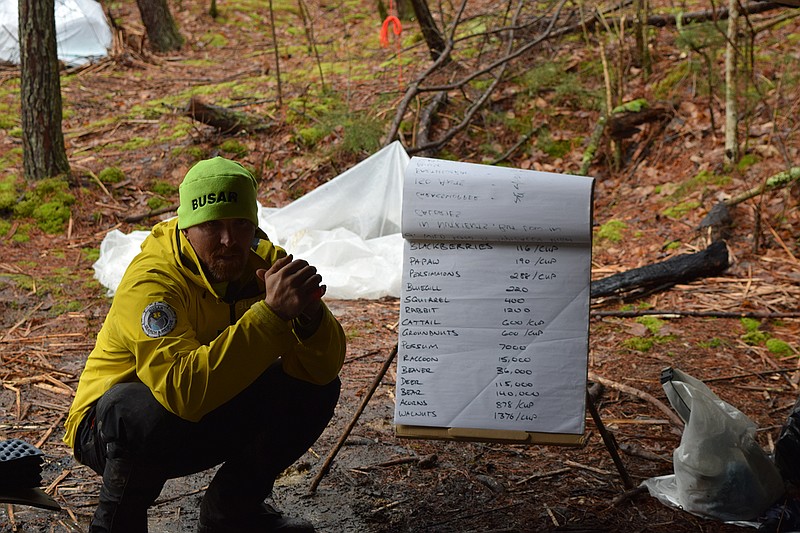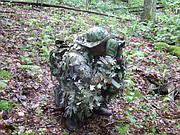Twenty-eight years ago, Andrew Herrington went rock climbing at Foster Falls.
"I was on the ground and had my head lowered when the rock hit me," says Herrington, now 45.
The falling rock fractured his skull, knocking him unconscious. His friends rushed up the steep trail to find help. Once they located a ranger, they raced back toward Herrington, who had begun having seizures.
But before they reached him, the ranger had a heart attack. EMTs arriving shortly thereafter faced a dire situation complicated by multiple emergencies and difficult terrain.
"It took them two hours to reach me," Herrington says.
Ultimately, both men survived. Though, Herrington was temporarily paralyzed on the left side of his body and still struggles with those fine motor skills today. But the accident impacted more than his dexterity - it rerouted his entire life.
First, he says, the experience taught him the critical importance of physical fitness. Second, his injury prevented him from joining the military, his childhood dream.
"I had this thirst for adventure and this thirst for public service," he says. "So I asked myself, 'What route can I take now?'"
Over the years, Herrington traveled a winding path. He worked as a whitewater raft guide; he trained as an ultimate cage fighter; he studied wildlife and fisheries science at the University of Tennessee.
While spending time on Catalina Island off the coast of California, he tried his hand at lobster fishing.
"We'd go at night and you're down in the water, and there are great whites in those waters. I was pretty uneasy about it, but I wanted to work through that whole process. I wanted to be a master of my own body. Fear is based on ignorance," Herrington says. "And the way you win any fight is to know your opponent."
Since his climbing accident, Herrington has dedicated his life to survival. He has studied outdoor emergency scenarios, identified common causes - injury, bad weather, gear failure or cold water immersion, for example - and tried to prepare for each of them.
Since 2001, Herrington has worked for the National Park Service's local wild boar eradication program. The job requires him to spend weeks at a time backpacking remote sections of the Great Smoky Mountains, hunting the invasive boar. Alone in the wild, Herrington has fine-tuned his outdoor survival skills even further.
"Whether I am headed out for the day or to camp for the week, I always ... check the weather, plan my trip and have appropriate maps. In my pack is my first aid kit, lightweight tarp, quilt, bivy pad, extra insulation in dry bags, personal locator beacon, two headlamps, extra batteries, backup compass, topo maps rain gear, water filter, canteen and some cordage," he says.
In 2013, he founded BigPig Outdoors, a Great Smoky Mountains-based school that hosts wilderness survival workshops and trains emergency responders in backcountry search and rescue. The focus of BigPig's search and rescue training is physical fitness.
"On average, rescue squads don't have a physical fitness standard," says Herrington, who requires his trainees be able to run 3 miles in 45 minutes, climb up and over a long row of picnic tables to reflect elevation changes, and perform a series of burpees and pull-ups, all while strapped to a 45-pound backpack - reality-based survival skills.
Survival reality television shows like "Man vs. Wild" often "pander to that 'living off the land' romanticism," Herrington says. Realistically, outdoor survival is not about fashioning arrows or forging food, he says. In fact, the average wilderness survival scenario lasts only 72 hours.
Herrington encourages his students, instead, to calculate the number of days they could survive without food. This number depends on a person's percentage of body fat, his or her basal metabolic rate and estimated daily caloric expenditure.
"I can go 30 days without eating," says Herrington - though, he's never had to test that. In his pack he also carries 70,000 calories, which, based on his math, would keep him alive for 28 days. "Survival is all about making good choices and being prepared."
In fact, Herrington has avoided numerous outdoor disasters simply by being prepared - physically and mentally. For instance, a trip plan, he says, can prevent a situation from turning critical.
"Tell someone where you're going and when you're going to be back. I always leave [a trip plan] with my wife and text one to my buddy." Search and rescue begins with an investigation. And that can take awhile, Herrington says, unless there is already an outline of that person's itinerary. "Now I've compressed my investigation down to five minutes," he says.
Moreover, preparation lends itself to peace of mind, he says. When an emergency arises, a person must act quickly.
"If you have to fight a bear, yes, adrenaline is awesome," says Herrington, who knows from experience. Once, while hog hunting in the Smokies, a black bear tried to enter his tent. "I punched it in the nose and it ran off. I came out [of my tent] and saw it was a sow with three cubs. I started shouting and they ran away."
But to make clear, calculated decisions, a person must be in command of his or her body. In his classes, Herrington also teaches skills like box breathing, a technique used for relaxation and concentration: inhale, hold, exhale, hold, each for 4 seconds.
When it comes to survival, "we all have this big computer sitting on our shoulders, and we just need to program it with good, strong software," Herrington says. "You have to ask yourself, 'What do you have to live for?' I want to make a positive difference in this world."

